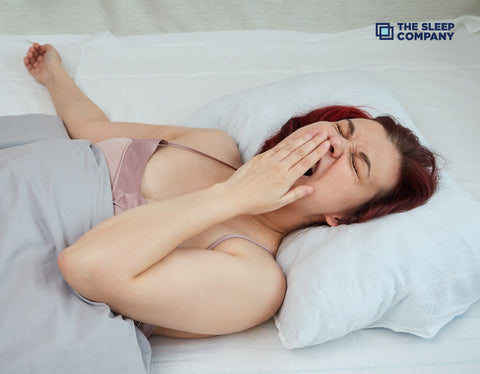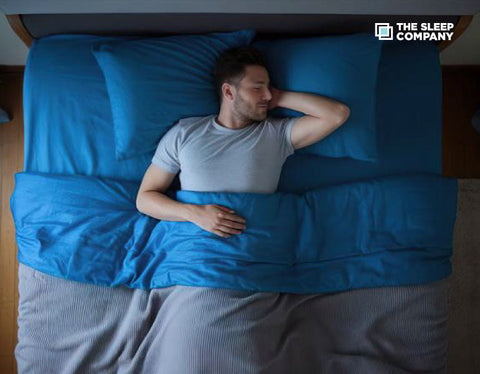My Cart

Sleeping Pill: Risks And Alternatives


One-third of the world’s population suffers from insomnia, while others may face it at a certain point in their life and consider taking the help of sleeping pills or sedatives.
Sleeping pills fall into the category of sedative-hypnotics. Due to its molecular formation, similar to Benzodiazepines, they connect with the same GABA receptors and cause drowsiness and feeling good effects. Thus, they work wonders for people who suffer from sleeping troubles and keep tossing and turning on the mattress all night.
Sometimes doctors prescribe sleeping pills to their patients to treat insomnia, promote sleep, or as surgical anesthesia. While sometimes, people take it by themselves without any prescriptions.
However, in both cases, due to high chemical compounds or particular contents, sleeping pills may impact your overall health in the long term.
Side effects of sleeping pills
So what harm do sleeping pills have on health?
1. Addiction
People often find sleeping pills so good that they take them every time they feel even the slightest problem sleeping. This further increases and ultimately makes them addicted, further escalating many serious physical, psychological, and neurological issues.
2. Memory issues
Sleeping pills contain a heavy amount of sedatives or doxylamine, melatonin, valerian, or chamomile. Despite being functional, the excessive consumption of these drugs has their side effects which impact your memory restoration brain cells and can cause you dementia or other memory-related issues.
3. Concentration problem
A blend of different and heavy sleep-inducing compounds such as doxylamine, melatonin, valerian, or chamomile makes you feel drowsy most of the day, making you tired and affecting your circadian rhythm. It all affects your concentration and makes you confused.
4. Damages nervous system
Sleeping pills suppress a part of the nervous system that keeps you awake. Thus, excessive sleeping pills may weaken your nervous system, leading to coma or death in some cases.
5. Other health issues
Besides the severe impacts on the nervous and cognitive systems, excessive consumption of sleeping pills can cause stomach issues, skin problems, and failure of other organs like kidneys, lungs, and heart.
Alternatives for sleeping pills
Sometimes it becomes necessary to take sleeping pills; however, due to their harmful side effects, it’s impossible to use them continuously. Therefore, many doctors and scientists suggest finding alternatives or other supportive aids to improve sleeping quality.
So, what alternatives or supportive aids can one use to improve sleep quality?
1. Nutritional food and drinks
Food items and drinks are the best sources to get all the nutrients, minerals, and compounds that can help you improve sleep quality. In fact, most food items have a rich amount of melatonin, tryptophan, serotonin, and other sleep-inducing hormones, nutrients, and minerals that work better than sleeping pills without any side effects.
The food items that help you get better sleep are
- Nuts and dry fruits walnuts, pistachios, almonds.
- Vegetables like spinach, lettuce.
- Dairy products like milk, cheese.
- Rice white, brown.
- Poultry products like chicken, eggs, turkey.
- Drinks like chamomile tea, almond milk, Ashwagandha tea.
2. Bed
Bed or the place where we sleep is generally a collection of sleeping mattresses, pillows, comforters, mattress protectors, etc. Thus, quality and comfortable materials are essential to have better sleep.
- A mattress or sleeping mattress is the main item on the list that completes the bed collection.
- Selection of the correct mattress is vital as the quality of it can cause you to get better sleep or make it worse due to various reasons like body pain.
- Thus, when you buy mattress online, ensure that you get one suitable for your body’s needs, giving you enough support and comfort without causing any problems.
- A mattress protector is a security cover for mattresses to protect them from being damaged due to external factors like sweating, spilled liquids, dust, and dirt.
- It also provides you extra comfort along with the mattress.
- Pillows are the next in line as they help as supportive aids for the mattress by elevating your head at the correct angle and reducing pressure on it.
- Pillows help you maintain the spinal structure by supporting it in the hollow of the neck where the mattress can’t reach.
- Comforters protect you from the cold and keep you warm enough to get enough sleep.
However, when it comes to buying the bed collection, people often get confused and make the wrong selection. Therefore it is recommended to do proper research before buying it about the company, manufacturers, quality of product, and costs. There are several companies that sell mattresses and other bedding products separately or collectively. One of the top mattress brands in India like The Sleep Company, which sells a variety of SmartGRID mattresses like a luxe, ortho, and hybrid. Also, they sell other bedding materials like pillows, mattress protectors, and comforters, separately or in a smart bundle with reasonable prices and the best qualities.
3. Bedroom climate, hygiene
The bedroom and its hygiene play a vital role in improving sleep quality. Since our brain is programmed to sleep in a sound and secure environment, maintaining a bedroom is essential.
There are several ways to make your bedroom comfortable and safe for sleeping.
- Keep it cool as our body sleeps better in cooler temperatures rather than warmer ones. When we sleep, our body temperature lowers. If the external temperature is warm, our body reacts to it by trying to get our body temperature at levels with external temperature and exhausts the brain and body in the process.
- Maintaining cleanliness is crucial since not just for sleep but overall health depends on it as dirt can make us fall sick and disrupt sleep. Also, dirty and unclean rooms may start to stink, which makes us uncomfortable and hard to sleep. Also, the researchers have found that our body finds clean, fragrant, and adequately ventilated places relaxing and welcoming. Which further makes you improve your sleep quality.
- Keep it dim, light, or dark since our circadian rhythm works on the day and night pattern outside. And to fall asleep quickly, our brain needs signals that it gets after seeing dark surroundings.
4. Sleeping habits
Besides external things, self-discipline and proper sleeping habits help you improve sleep quality drastically.
Good sleeping habits that can help us improve our sleep quality are
- Regular sleep-wake schedule, which we don’t break on weekends and holidays either. Sleeping at the same time every day and waking up at the same time every day helps you set the routine on which your brain and body adapt. Once we get used to sleeping at a particular time, our brain starts sending signals to our body automatically as soon as the time comes.
- Maintain proper meal time, quantity, and menu as it helps us to remain healthy with proper body functioning, sleep quality, and correct metabolism. Avoid eating heavy meals before bed, and ensure you eat your food at least 2-3 hours before bed. Also, avoid alcohol, caffeine, and food that may keep you awake all night.
- Create a bedtime routine like reading a book before bed, relaxing me-time, meditation, and listening to soft music. Our brain becomes relaxed due to these activities, and it helps us fall asleep quickly.
- Exercise is another healthy habit that helps us remain in shape and improve sleep quality. Everyday activities like walking, yoga, and breathing release specific sleep-inducing hormones that make your body relax and sleep as soon as you hit the mattress.
Bottom Line:
Thus, despite sleeping pills being fast enough to bring that most awaited sleep because of their harmful side effects, selecting alternative options is always better for long and healthier life.


































































